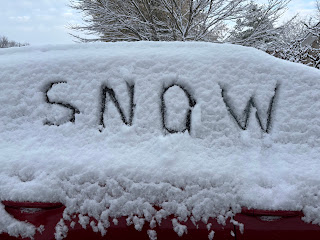Book #73 of the year was The Cliffs, by J. Courtney Sullivan. I really enjoyed this book about family history, inheritance, houses, alcoholism, and other things. It was quite woo-woo.
Book #74 was Counting Miracles, by Nicholas Sparks. This was my first Sparks novel, and I read it with my book group. Prior to this, I had read one of Sparks' books, but a non-fiction one, Three Weeks with My Brother (the link is to what I wrote about it at the time, in 2009). The story was a little slight (it felt as though the conflict was manufactured just to keep the plot going), and the back-story was super-traumatic (wait, I though this was just going to be a fun read!), but overall it was entertaining. Plus, our discussions are always great, no matter what we read. Looking forward to another year of reading with my book group buds!
Book #75 was The Unwedding, by Ally Condie. It was a murder mystery set at a wedding, and I do seem to have read a lot of this kind of thing this year, rather forgettable page-turners. Maybe time for a little upgrade in 2025?
Book #76 was Playground, by Richard Powers. I've never read a Richard Powers book that wasn't very much worth reading. I think maybe my favorite is still the first one I read, The Echo Maker. But this one was terrific too. It's about the ocean, AI, long friendships, and climate change. Highly recommended.
Book #77 was The Five-Star Weekend, by Elin Hilderbrand. This was my third Hilderbrand book. They are all beach-y books, but with something a bit more, making them less forgettable. This one is definitely fluffy, but I can't stop reading books about friendships.
Book #78 was in our library at school. It's out of print, and I enjoyed it a lot, so I'm including it even though it took me less than half an hour to read. It was Have You Ever Heard of a Kangaroo Bird?, by Barbara Brenner.
Book #79 was The Lioness, by Chris Bohjalian. This was probably not the best book to read right before going on safari. It's about an actress in the 1960s who goes on safari in Kenya, taking a collection of her favorite people. Dreadful things ensue.
Book #80 was Home Front, by Kristin Hannah. Jolene flies helicopters for the National Guard, and her husband isn't supportive. He's especially not supportive when she gets deployed to Iraq. The family (which includes two kids) suffers horrendously but the book is ultimately redemptive. This was my fifth Hannah book. I think three of them were this year.
Book #81 was How to Stay Married, by Harrison Scott Key. The subtitle is "The Most Insane Love Story Ever Told," which is a lot to live up to, but it is definitely an insane love story. I really couldn't believe his wife was OK with him telling all these details, but he says she was. It's a good read.
Book #82 was Absolution, by Alice McDermott. McDermott wrote one of my all-time favorite books, That Night, but I'm pretty sure I haven't read anything else she's written. This was very good. Set mostly in Saigon, different points of view, looking back over life - just very good.
Book #83 was Chanson Douce, by Leïla Slimani. I read the English translation of this, The Perfect Nanny, back in 2019. At the time I said what I liked best about it was the setting in Paris. I'm not sure why I liked that best, since it's definitely the underside of Paris, what it's like for people who can't afford the good life. It's just a horrid story, given that the first line is: "Le bébé est mort." (The baby is dead.) It's well-written, though.
Books #84 and 85 are ones I've read every year for a while, Savor, by Shauna Niequist and You are the Beloved, by Henri Nouwen.
I think that's it for this year, though I'm in the middle of a couple of books, so the first update of the new year is probably coming soon. I've already mentioned in this post that I'd like to read fewer forgettable books in 2025. I did read a lot of good stuff (see below), but there were quite a few I wouldn't even know I'd read if I hadn't posted about them. I'd also like to read more paper books. Practically everything I've read this year has been on my Kindle. I like reading on my Kindle, but I'm accumulating paper books that I just never pick up. Yes, in spite of vowing not to buy more books, I have bought more than intended. It's a sickness. But I'm not ever again going to reach the enormous number of books we had in Haiti. At least, that's my resolution.
Here's the rest of what I read this year.




